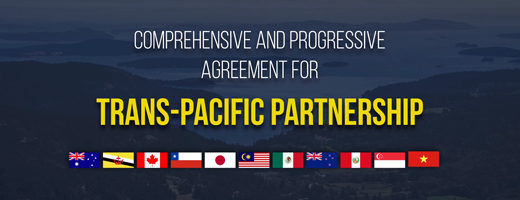CPTPP Agreement taken effect: Vietnam eliminates nearly 100% of tariffs after 7-10 years
The National Assembly has passed the Resolution on on ratifying the CPTPP Agreement and related documents on November 12th, 2018. Accordingly, the Agreement has come into force for Vietnam since January 14th, 2019. Previously, the CPTPP Agreement has officially taken effect since December 30th, 2018 as for the first six countries to complete the ratification of the Agreement, including Mexico, Japan, Singapore, New Zealand, Canada and Australia.

CPTPP is one of the biggest trade agreements in the world. The countries included in the Agreement: Australia, Brunei, Canada, Chile, Japan, Malaysia, Mexico, New Zealand, Peru, Singapore and Vietnam. 11 CPTPP members countries with 499 million people and gross domestic product (GDP) of more than 10,000 billion USD, accounting for over 13% of the global GDP. This Asia's latest multilateral trade agreement eliminates not only tariffs on goods but also barriers to investment, services and data, opening up opportunities in retail, banking and electronic commerce.
Vietnam commits to eliminate nearly 100% of tariffs, therein, 65.8% of which will become 0% as soon as CPTPP takes effect; 85.5% to 0% in the 4th year; 97.8% to 0% in 11th year; The remaining goods (considered sensitive) are committed to abolish import tax with a maximum schedule of 16 years, or under tariff quotas. Specifically, as for industrial goods such as automobiles, tax will be eliminated in the 13th year for new cars and to 0% after 16 years; iron, steel and petroleum will be mostly eliminated in the 11th year; plastic and plastic products in the 4th year; textile and footwear eliminated immediately when CPTPP is effective ... As for agricultural and aquatic products, Vietnam commits to eliminate tax on chicken in the 11th year; fresh pork in the 10th year and frozen meat in the 8th year; rice eliminated immediately when CPTPP takes effect; corn in the 5th year; Meat-processed foods eliminated in the 8th year to the 11th year; seafood processing in the 5th year ...
Vietnam will amend a number of laws and decrees in the process of reviewing the law to comply with the regulations of CPTPP, applying directly many commitments, especially in the field of service and investment opening. System reform helps improving the business environment, maintaining and growing foreign and domestic investment, focusing on exports to take advantage of the CPTPP market, raising the competitive capacity of Vietnamese goods. New customs regulations under CPTPP will make cross-border trade flows smooth. Member countries need to ensure that goods can be delivered within 48 hours after arriving at the airport. Visa issuance will also become faster. Some member countries will grant visas quickly for family members traveling with entrepreneurs. CPTPP also restricts countries managing to keep domestic customer data on servers located in their territory. Companies operating in commercial bloc can run businesses based on data, using servers in their country or in a third country, thereby reducing initial investments to penetrating a new market.
According to the World Bank's calculations, direct benefits that CPTPP brings to Vietnam help GDP increasing by 1.1% in 2030, and indirectly by 3.6%. In addition, CPTPP also brings benefits from non-tariff barriers.
*****
Please contact us for any further concerns related to the topic of this article.
About Us
Asia Business Consulting is a boutique consulting firm specializing in corporate establishment, legal and business advisory, tax and payroll compliance, HR administration, market research to multinationals investing in Vietnam. For further information or to contact the firm, please email This email address is being protected from spambots. You need JavaScript enabled to view it. or download the company brochure. You can stay up to date with the latest business and investment news in Vietnam by subscribing for our newsletters.